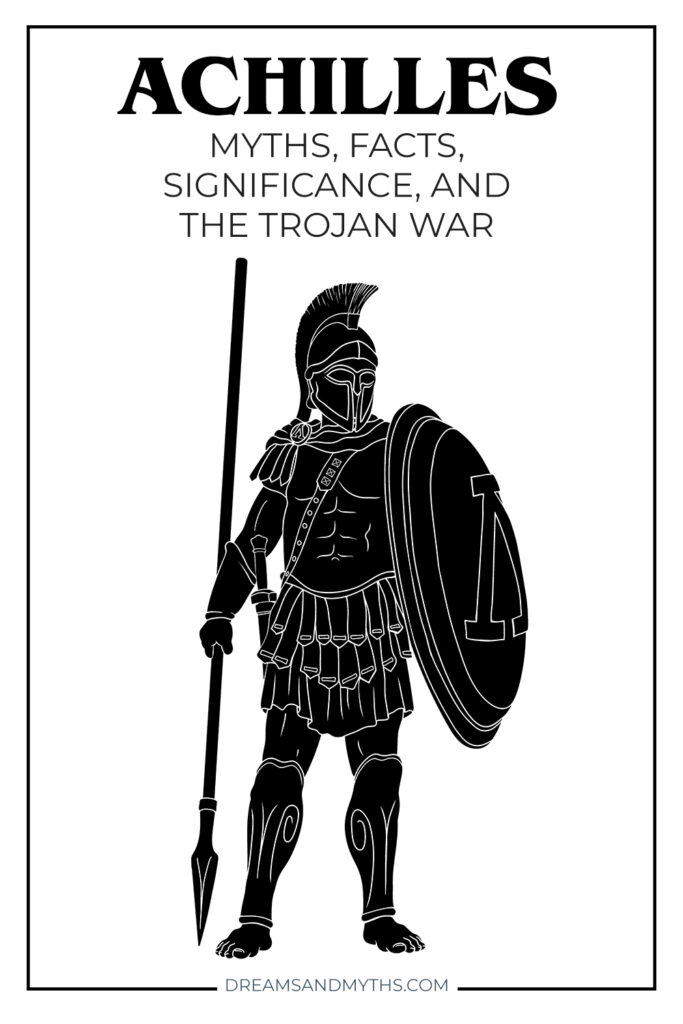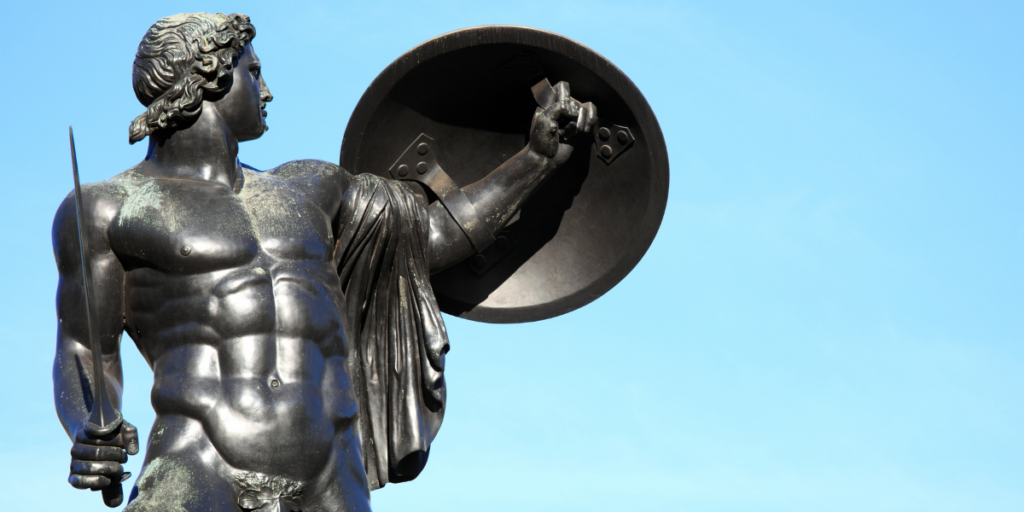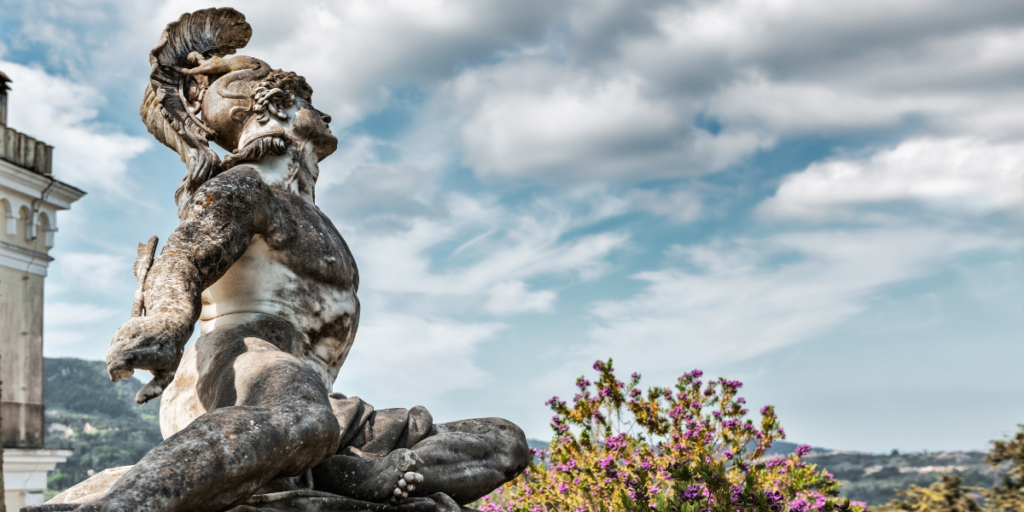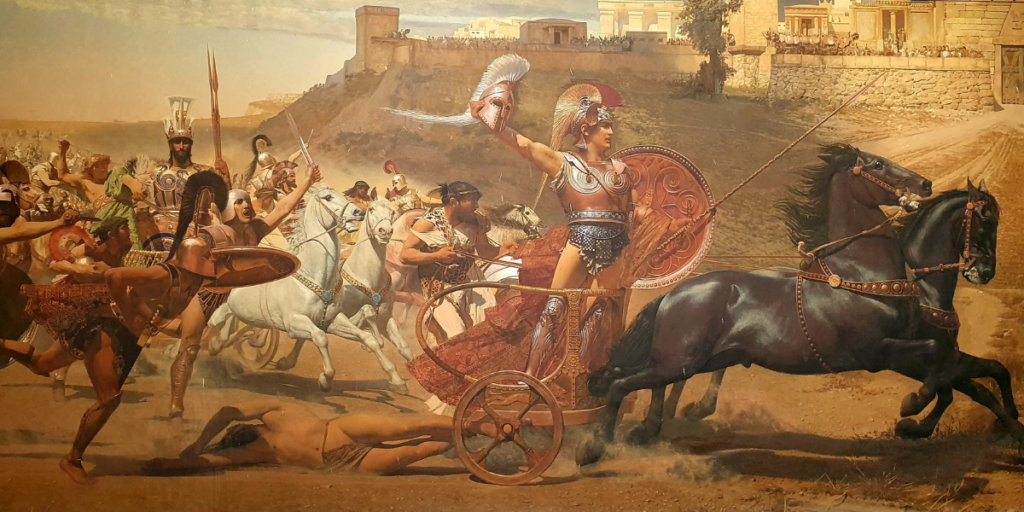When you hear the name “Achilles,” you might associate it with the popular English phrase that is a metaphor for a weak spot in an individual. Although the phrase has a negative connotation, Achilles held a very important position in the Greek pantheon, alongside Hercules.
Achilles was a mythical figure in Greek mythology and a particularly significant hero who played a key role in Troy’s siege. His effort and contribution to the rescue of Helen of Troy are commendable. Achilles was one of the bravest and most prestigious warriors in the Achaean army.

He was born to a sea nymph named Thetis and the king of the Myrmidons of Thessaly called Peleus. Achilles was born half-human and a half-god which made him vulnerable to old age and death, unlike his parents, who were immortal.
Legend says that his mother held Achilles by his heel and immersed him in the Styx river belonging to the underworld. The idea was to protect him from the rest of the world. Dipping him in the River Styx made him invincible, except for his heel, which was his weakest point.
Did you know – Thessaly was the primary abode of Greek mythology heroes Jason and Achilles. However, it was also home to several tribes, such as Pelasgians, Aeolians, Perrhaebi, etc., and even housed many Greek mythical creatures like Lapiths, Ixion, Myrmidons, Phlegyans, and Centaurs.
Origin of Achilles
The supreme Greek god Zeus and Poseidon both shared the same love interest. They feel for the mother of Achilles, the sea nymph, Thetis. In response to this, Themis, the Greek god who symbolized fairness and justice, mentioned in his divine prediction that if Thetis gave birth to a child with either Zeus or Poseidon, the child would turn out to be stronger than its father.
Zeus already knew what it was like to be more powerful than the father. As Zeus was also responsible for murdering his father, Cronus – after Cronus swallowed his siblings just after their birth. However, as he was mightier than Cronus, so he made his father vomit all the swallowed children, including Poseidon.
Fearing patricide, Zeus and Poseidon decided to sacrifice their love for Thetis. So, instead of marrying Thetis, they married her off to Peleus. Peleus was a mortal and the grandson of Zeus, who later is also known to have lived longer than Achilles.
Myths Associated With Achilles

According to another myth, it was believed that Thetis was not impressed and thus rejected Zeus’s marriage proposal. The disappointed god then proclaimed that Thetis could never marry a god and eventually ended up marrying a mortal.
Peleus was obviously excited and grateful to be wed to a goddess. Unhappy, Thetis was, however, not willing to engage in this union and ran off to avoid her marriage with Peleus. But Peleus brought her back with the help of a centaur. Thetis was angry and refused to marry because she did not want her child to be a mortal with no extraordinary powers.
She had even tested the immortality of her six children before the birth of Achilles by throwing them in fire or in a vessel filled with boiling hot water. It turned out that none of her six children passed the test and ended up dead.
So, given that Achilles was the only child of Thetis. Just when Thetis tried finding out if Achilles was an immortal being by holding him by his heel near the fire, Peleus stopped her from doing so and managed to save Achilles.
Thetis and Achilles
Thetis was a stubborn goddess. So she made a strong resolve to make Achilles immortal. In an attempt to grant immortality to her son, she picked him up by his heel and soaked him in the River Styx, leaving his heel the only vulnerable part of his body. The Styx river that flowed in the underworld symbolized death and hate.
Achilles and Chiron

It is also believed that Achilles spent some part of his childhood with a centaur named Chiron. Peleus, Achilles’ father, instructed Chiron to train and educate Achilles to the best of his abilities to become a true warrior.
Chiron had the appearance of half-man and half-horse and lived in Thessaly. Most centaurs had a bad reputation and were ill-famed for engaging in lawlessness and excessive drinking along with other vices. But Chiron was exceptional with extremely virtuous qualities.
Chiron ensured to make Achilles stronger by keeping him on a lavish diet of wild boar meat and bone marrow of bear bones. Achilles learned healing as well as all his extraordinary hunting and fighting skills from Chiron. This shows that Chiron’s contribution to Achilles’s success is praiseworthy, as Achilles went on to use Chiron’s spear at Troy and emerge victorious.
Patroclus and Achilles
In Homer’s Illiad, it is stated that Patroclus was the childhood friend of Achilles, whom he spent the most time with. In other accounts, it is said that Patroclus then went on to become his war companion as well as his lifelong partner. Homer’s Illiad never portrayed the two of them involved in a homosexual relationship.
But the works of Aeschylus, Aeschines, and Plato explicitly mention that Achilles and Patroclus shared a bond deeper than friendship and are called lovers.
Legend says that Achilles refuses to participate in the war against the Trojans after being enraged at Agamemnon for insulting him. But when the Achaeans are in danger, Patroclus decides to take the lead, wears the armor of Achilles, and defeats the Trojans. Under the leadership of Patroclus, the Myrmidon army won the battle but ended up losing Patroclus in the intense fight. Patroclus was eventually killed by Hector.
Shocked by the death of Patroclus, Achilles rubs his dead friend’s ash all over him, starts fasting, and even asks him to be buried with the ashes of Patroclus when he dies. Patroclus’ death marks the turning point in the Trojar War as it motivates angry Achilles to get back to the battlefield with full power. Later in the act of vengeance, he kills Hector and brutally ferries his dead body by tying his corpse to the back of his chariot and dragging him all around after the war.
Later, he also organized games like chariot races in honor and memories of his old friend.
Another Prophecy

One more prophecy revealed that Achilles would die in the war. Fearing his death, his shocked parents, in an effort to save him, send him away to hide on the Island of Skyros disguised as a girl. But the Greeks take help from the cunning Odysseus to bring him back to lead the Myrmidons.
Odysseus gifts the disguised Achilles with a number of things such as jewelry, swords, and shields. Achilles immediately goes for the sword and the shield, eventually revealing his true self. So, Odysseus successfully brings Achilles back to Troy with fifty ships and several mighty Myrmidon fighters.
The Trojan War
The Trojan War went on for twelve years in which Achilles and his best warriors managed to plunder 12 cities near the sea and 11 cities close to the land. He also manages to apprehend Chryseis and Briseis. Achilles then gives Chryseis off to Agamemnon, but she is eventually rescued by her father, who offers a ransom to Agamemnon for letting her go.
Agamemnon refuses initially but is forced to give her up after Apollo‘s plague and takes Briseis into captivity instead. Achilles does not appreciate this act of Agamemnon as it is believed that he likes Briseis. He disapproves of Agamemnon’s behavior and refuses to participate in the war. The absence of Achilles gives the Trojans an upper hand in the war.
Agamemnon requests Achilles to join back the battle by agreeing to offer some treasure along with Briseis. Achilles is still adamant and refuses even after multiple attempts by Odysseus to lure him. Meanwhile, countless Greek warriors are martyred, and several warships are destroyed by the Trojans led by Prince Hector.
Eventually, Patroclus manages to persuade him, and after the death of Patroclus, Achilles is encouraged to march back to the battlefield to avenge his death.
For the final battle, Thetis ordered Hephaestus, the godly craftsman, to create a sturdy, gold armor for Achilles. The armor was so strong that even the arrows could not penetrate it. Achilles was hellbent on killing Hector. Under the incredible leadership of Achilles, the Greeks managed to slash hundreds and thousands of Trojan fighters filling the river Xanthos with their blood.
In the showdown, when Hector and Achilles are up in arms against each other, Hector’s sly father, Priam, hurls a spear at Achilles in order to kill him. But the spear has no effect on the armor of Achilles. Hector then starts running for his life, but the chase ends after three consecutive rounds around the city. Achilles manages to get hold of Hector and attacks him by shoving the same spear into his throat, killing him to death.
Conclusion
Hector’s father, accompanies by the messenger god Hermes, begs Achilles to return his son’s body back to Troy. After relentless convincing, Achilles finally agrees. He continues his dominance in the Trojar war until one fateful day when Hector’s brother Paris shoots an arrow targeting the heel of Achilles, killing him to death.
Despite the imperfections in his character, Achilles, although not a major god, still continues to be a central figure in Greek mythology.
